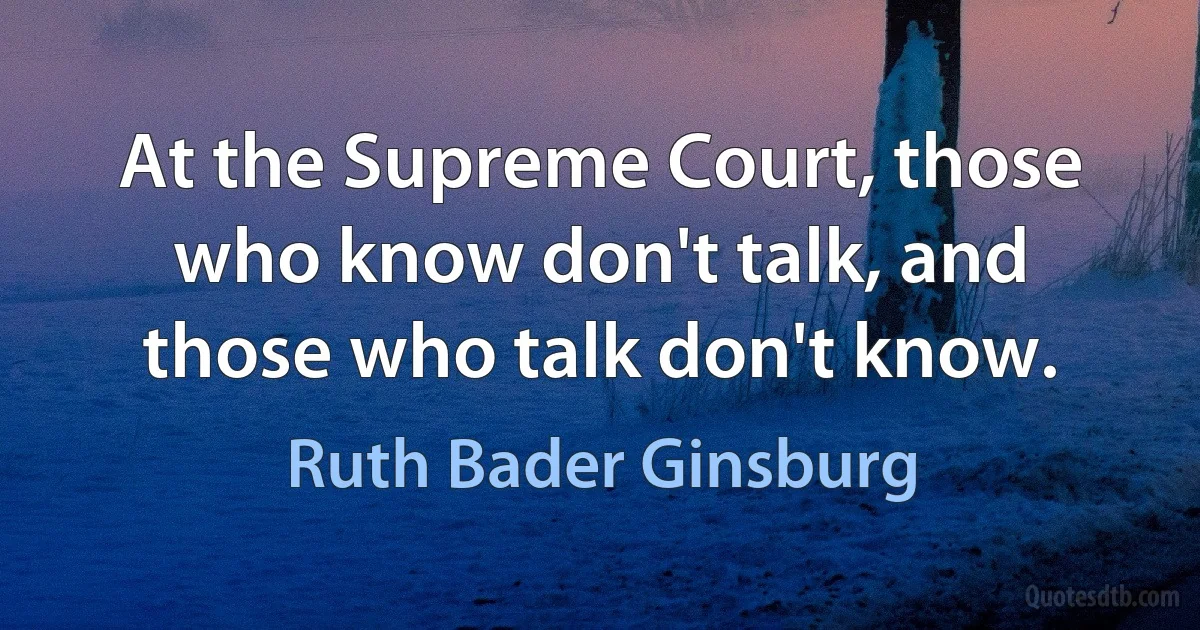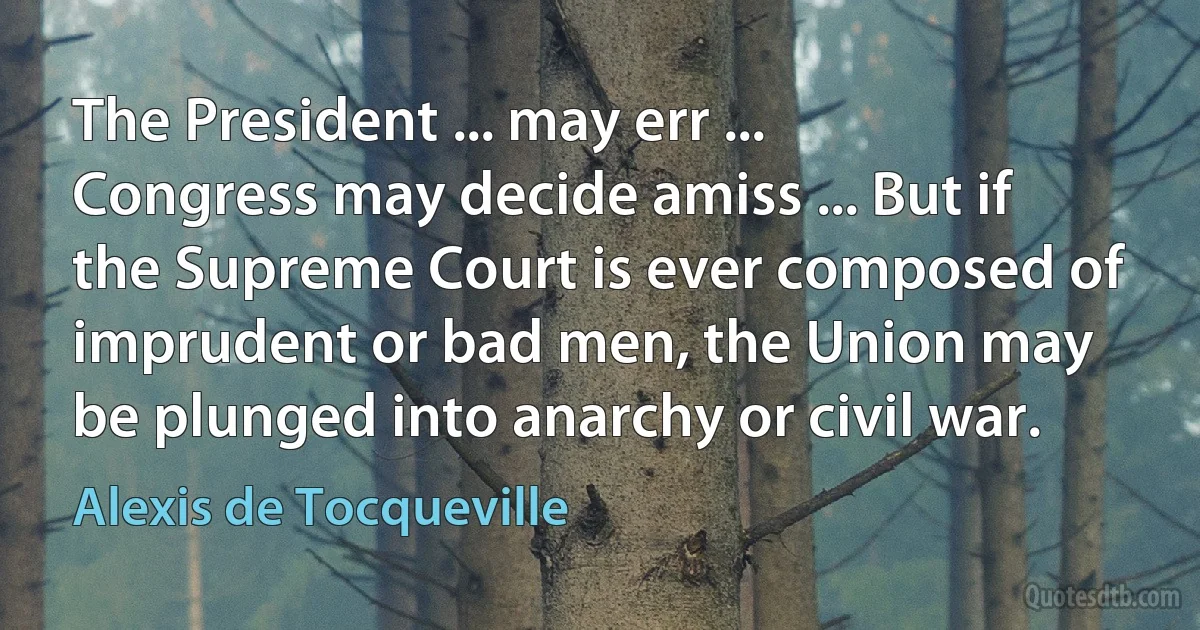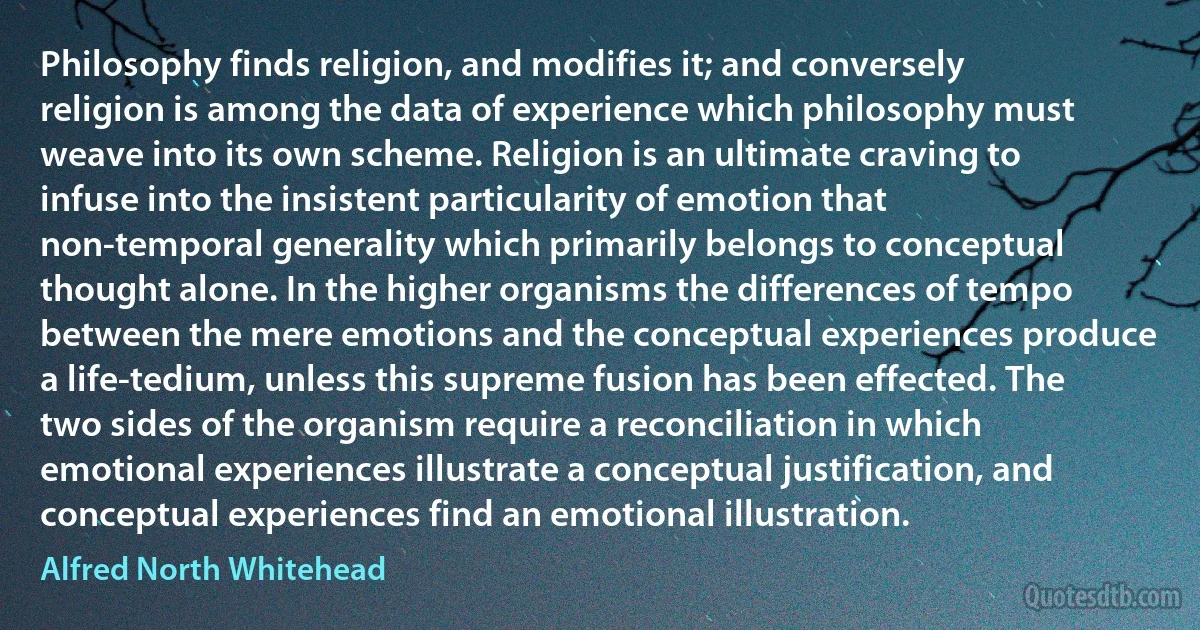Supreme Quotes - page 44
He is a clown in blackface sitting on the Supreme Court. He gets me that angry. He doesn't belong there. Ande saw the movie 12 Years as a Slave, you know, they were raped. And he says they had dignity as slaves or- My parents lost everything that th middle of their lives, in their thirties. His business, my father's business, our home, our freedom and we're supposed to call that dignified? Marched out of our homes at gun point. I mean, this man does not belong on the Supreme Court. He is an embarrassment. He is a disgrace to America.

Clarence Thomas
I will insist that the Hebrews have done more to civilize men than any other nation. If I were an atheist, and believed in blind eternal fate, I should still believe that fate had ordained the Jews to be the most essential instrument for civilizing the nations. If I were an atheist of the other sect, who believe or pretend to believe that all is ordered by chance, I should believe that chance had ordered the Jews to preserve and propagate to all mankind the doctrine of a supreme, intelligent, wise, almighty sovereign of the universe, which I believe to be the great essential principle of all morality, and consequently of all civilization.

John Adams
Being absolute, the supreme Principle is ipso facto infinite; the masculine body accentuates the first aspect, and the feminine body the second. On the basis of these two hypostatic aspects, the divine Principle is the source of all possible perfection; in other words, being the Absolute and the Infinite, It is necessarily also Perfection or the Good. Now each of the two bodies, the masculine and the feminine, manifests modes of perfection which their respective gender evokes by definition; indeed, all cosmic qualities are divided into two complementary groups: the rigorous and the gentle, the active and the passive, the contractive and the expansive. The human body is an image of Deliverance: now the liberating way maybe either "virile" or "feminine", although it is not possible to have a strict line of demarcation between the two modes, for man (homo, anthropos) is always man; the non-material being that was the primordial androgyne survives in each of us.

Frithjof Schuon
Ironically, during four years of war, MacArthur may have owed the most to the very people he was certain were out to discredit and disparage him. While never among his fans, Franklin Roosevelt and George Marshall nonetheless consistently supported MacArthur within the framework of their global priorities, from the first efforts to resupply the Philippines to MacArthur's appointment as Allied supreme commander. Even then, where would MacArthur's Southwest Pacific Area have been had not Ernie King urged the Joint Chiefs to pour resources into the Pacific and wage a two-front war?

Douglas MacArthur
With his flamboyant headgear, his sunglasses and corn cob pipe, he looked like an actor playing the role of a great general. He also had the sort of press an actor likes; he arranged that, in part, by keeping his subordinates as anonymous as possible. But the truth was that Douglas MacArthur, Supreme Commander of Allied Forces in the Southwest Pacific, was a great general. He had one of the most distinguished military careers on record (top of his class at West Point, a hero in the first war, Army Chief of Staff), and it is doubtful that anyone in any of the services knew more about the Pacific theater. Nonetheless, the war that would be waged to return him to the Philippines, as he had promised, would be a Navy war, and [three admirals] - Nimitz, King, and Halsey - would have every bit as much to do with the strategy and tactics of winning that war as he had.

Douglas MacArthur
The prophets were the heralds of the fundamental truth that religion and ethics are inseparable, and that ethical conduct is the supreme and sufficient religious act. If that principle had been fully adopted in our religious life, it would have turned the full force of the religious impulse into the creation of right moral conduct and would have made the unchecked growth and accumulation of injustice impossible.

Walter Rauschenbusch
Kennedy made several missteps in his long career. His primary challenge to the centrist President Jimmy Carter probably contributed to Ronald Reagan's landslide general-election victory. His hyperbolic warning that confirming Robert H. Bork for the Supreme Court would usher in the return of segregated lunch counters and back-alley abortions sowed the seeds of today's petty partisanship over judicial selection. Taken all in all, however, Kennedy contributed enormously to the realization of the sort of society he championed, despite -- or perhaps because of -- his failure to win the White House.

Ted Kennedy
The West regards as truth what the Hindu regards as appearance (for if human life, in the age of Christendom, was doubtless an ordeal it was certainly truth and not illusion), and the Westerner can regard knowledge of the the universe as the supreme value, while for the Hindu the supreme value is accession to the divine Absolute....
But the most profound difference is based on the fact that the fundamental reality for the West, Christian or athiest, is death, in whatever sense it may be interpreted --- while the fundamental reality for India is the endlessness of life in the endlessness of time: Who can kill immortality?

André Malraux
Dadaism and surrealism ... represented the intoxication of total license, the intoxication in which the mind wallows when it has made a clean sweep of value and surrendered to the immediate. The good is the pole towards which the human spirit is necessarily oriented, not only in action but in every effort, including the effort of pure intelligence. The surrealists have set up non-oriented thought as a model; they have chosen the total absence of value as their supreme value. Men have always been intoxicated by license, which is why, throughout history, towns have been sacked. But there has not always been a literary equivalent for the sacking of towns. Surrealism is such an equivalent.

Simone Weil
It may be dismissed, on the one hand, as a commonplace aesthetic satisfaction: and, on the other hand, if we say that the idea of God is merely a poetic idea, even if the supreme poetic idea, and that our notions of heaven and hell are merely poetry not so called, even if poetry that involves us vitally, the feeling of deliverance, of a release, of a perfection touched, of a vocation so that all men may know the truth and that the truth may set them free - if we say these things and if we are able to see the poet who achieved God and placed Him in His seat in heaven in all His glory, the poet himself, still in the ecstasy of the poem that completely accomplished its purpose, would have seemed, whether young or old, whether in rags or ceremonial robe, a man who needed what he had created, uttering the hymns of joy that followed his creation. This may be a gross exaggeration of a very simple matter. But perhaps the same is true of many of the more prodigious things of life and death.

Wallace Stevens
A small but significant number of angry and historically minded women comprehend the women's revolution in the visionary sense of an end to the catastrophic brotherhood and a return to the former glory and wise equanimity of the matriarchies. We don't know how this will take place exactly, nor the resultant nature of the new social forms, we know that it will take place, and in fact that the process of its development is now irreversibly underway. Of supreme importance in this process is the recovery by modern woman of her mythology as models for theory, consciousness, and action.... The Swiss patrician Jacob Bachofen was one of the first to discover "the female era at the lower seam of history, with its sacerdotal, political, and economic female dominion." .... The fruits of this research were until recently unavailable except to a few initiates and they now form a cornerstone of the second wave in the feminist revolution....

Jill Johnston
Several of these conservative Justices, who are in no way accountable to the American people, have lied to the U.S. Senate, ripped up the Constitution and defiled both precedent and the Supreme Court's reputation - all at the expense of tens of millions of women who could soon be stripped of their bodily autonomy and the constitutional rights they've relied on for half a century.

Nancy Pelosi
From the German point of view the monstrous problem thus set must inevitably be solved by the apotheosis of the German peoples. In the meantime, far from ‘German culture' seeming disposed to reform itself, we hear it proclaiming louder than ever a universal right to supreme domination, which confers on it the right of life and death over the nations, to be asserted and enforced by all possible means. Ought we not all to feel menaced in our very vitals by this mad doctrine of universal Germanic supremacy over England, France, America, and every other country?

Georges Clemenceau
SF means Supreme Fascist - this would show that God is bad. I don't claim that this is correct, or that God exists, but it is just sort of half a joke. ... As a joke I said, "What is the purpose of Life?" "Proof and conjecture, and keep the SF's score low."
Now, the game with the SF is defined as follows:
If you do something bad the SF gets at least two points.
If you don't do something good which you could have done, the SF gets at least one point.
And if nothing - if you are okay, then no one gets any point.
And the aim is to keep the SF's score low.

Paul Erdős
Water and a bubble on it are one and the same. The bubble has its birth in the water, floats on it, and is ultimately resolved into it. So also the Jivatman (individual soul) and the Paramatman (supreme soul) are one and the same, the difference between them being only one of degree. For, one is finite and limited while the other is infinite; one is dependent while the other is independent. (22)

Ramakrishna
Two friends went into an orchard. One of them possessing much worldly wisdom, immediately began to count the mango trees there and the number of mangoes each tree bore, and to estimate what might be the approximate value of the whole orchard. His companion went to the owner, made friends with him, and then, quietly going into a tree, began at his host's desire to pluck the fruits and eat them. Whom do you consider to be the wiser of the two? Eat mangoes. It will satisfy your hunger. What is the good of counting the trees and leaves and making calculations? The vain man of intellect busies himself with finding out the "why" and "wherefore" of creation, while the humble man of wisdom makes friends with the Creator and enjoys His gift of supreme bliss. (164)

Ramakrishna
The Infinite alone justifies the existence of the finite and the finite by itself has no entirely separate value or independent existence. Life, if it is not an illusion, is a divine Play, a manifestation of the glory of the Infinite. Or it is a means by which the soul growing in Nature through countless forms and many lives can approach, touch, feel and unite itself through love and knowledge and faith and adoration and a Godward will in works with this transcendent Being and this infinite Existence.
This Self or this self-existent Being is the one supreme reality, and all things else are either only appearances or only true by dependence upon it. It follows that self-realisation and God-realisation are the great business of the living and thinking human being. All life and thought are in the end a means of progress towards self-realisation and God-realisation.

Sri Aurobindo
Now the U.S. Supreme Court has spoken. Let there be no doubt, while I strongly disagree with the court's decision, I accept it. I accept the finality of this outcome which will be ratified next Monday in the Electoral College. And tonight, for the sake of our unity as a people and the strength of our democracy, I offer my concession. I also accept my responsibility, which I will discharge unconditionally, to honor the new President-elect and do everything possible to help him bring Americans together in fulfillment of the great vision that our Declaration of Independence defines and that our Constitution affirms and defends.

Al Gore
I love this country deeply, and even though I always look to the future with optimism and hope, I do think it's worth pausing for just a moment as we begin this year's convention, to take note of two very important lessons from four years ago.
The first lesson is this: Take it from me; every vote counts. In our democracy, every vote has power. And never forget that power is yours. Don't let anyone take it away from you or talk you into throwing it away.
And let's make sure that this time every vote is counted. Let's make sure that the Supreme Court does not pick the next President, and that this President is not the one who picks the next Supreme Court.
The second lesson from 2000 is this: What happens in a presidential election matters - a lot. The outcome profoundly affects the lives of all 293 million Americans, and people in the rest of the world, too. The choice of who is president affects your life and your family's future.

Al Gore



